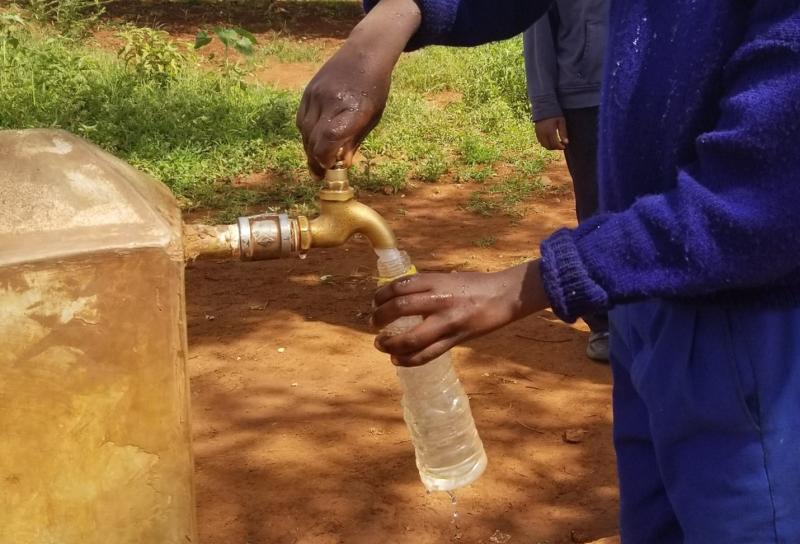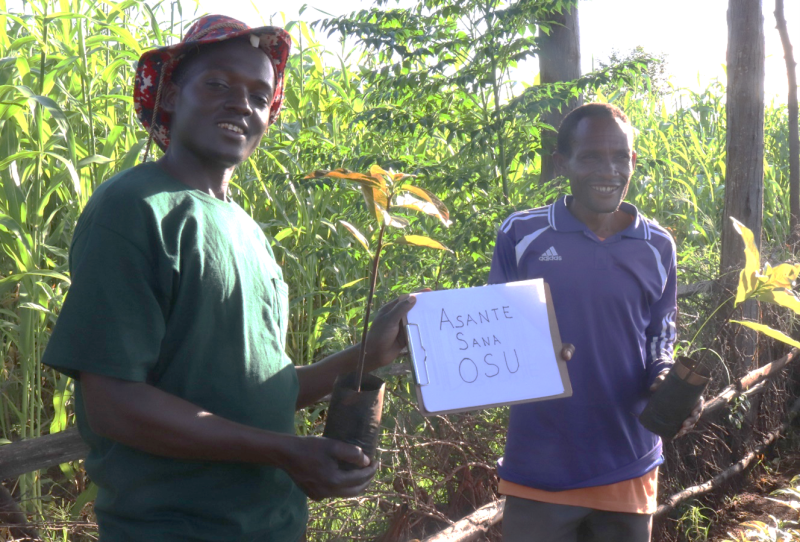Addressing multiple community needs with improved water access, agricultural productivity, health, and food security

The Situation
In rural parts of the United Republic of Tanzania, only 45% of the population has access to at least basic water services, with more than 21 million people relying on unsafe water sources.
Clean water scarcity affects every aspect of human potential, including health and agriculture. More than 10% of Tanzanian people do not have access to sufficient food and more than 31% of children under 5 suffer from malnutrition (stunting).
Safe water for household use, reliable crop harvests, food security, water for schools and health clinics –rural communities have multiple and overlapping needs that must be met for improved health and livelihoods.
In the semi-arid region of Singida in central Tanzania, the villages of Ghalunyangu and Mughanga asked GWI and its partners to tackle two critical needs simultaneously: improved safe water access and better agricultural production.


left: A new water distribution point in central Ghalunyangu. right: Avocado seedlings growing in a new forest garden nursery.
Our Work
The Water for Rural Development program was developed by GWI in response to the needs described by residents in Ghalunyangu and Mughanga.
Work began in 2017 with planning for new water system infrastructure and creation of volunteer farmer groups for agricultural training. The water distribution systems were designed in line with community requests and constructed with contributions from community residents.
Over the next 3 years, GWI worked with partners WorldServe International (water infrastructure), BM Farm Africa (agricultural training), Trees for the Future (forest garden training), and Global Partners for Development (monitoring and evaluation), and with strong support from local and national representatives of the Ministry of Water.
By the conclusion of the project in 2021, the Water for Rural Development program had achieved:
- New or improved access to clean water for approx. 6,000 people, with drilling and construction of new solar-powered water systems and distributed access points around the villages and sub-villages
- New, dedicated water access for the Ghalunyangu primary school, which serves approx. 700 students who previously had to walk 2 km to bring water to school
- New, dedicated water access for the Ghalunyangu healthcare facility, which includes a labor and delivery unit and previously did not have any water on site
- 60 farming families trained in creating forest gardens (of which 40% of the lead farmers were women), benefitting nearly 500 people
- Reduction of food insecurity from 52% to 26% for families in the forest garden program along with improvements in household dietary diversity and crop production for sale
- 180 farmers trained in agricultural practices and agribusiness through individual and group training, including 3 women-only farming groups
- 93% increase in monthly crop sales for farmer groups in Mughanga

Expanding on the Water for Rural Development program, GWI led a consortium of partners to develop a proposed Sustainable Village Water Systems approach that would combine improved water access and agricultural production with improved sanitation and hygiene, workforce development, and water resource data support.
Together, GWI, WorldServe International, Trees for the Future, BM Farm Africa, Global Partners for Development, WEDECO, WaterBoys, University of Dodoma, Sokoine University of Agriculture, and Talus Analytics submitted a proposal to the MacArthur Foundation’s 100&Change competition in 2019.
Visit YouTube to watch Sustainable Village Water Systems: Tanzania Today, Sub-Saharan Africa Tomorrow.
The proposal was judged to be in the Top 100 of all submitted proposals and awarded a place on the Lever for Change’s Bold Solutions Network.
